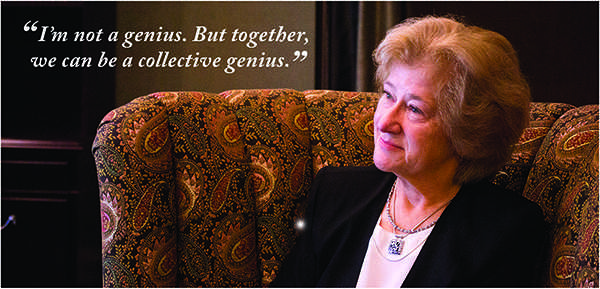Q+A: Rondeau’s call to action for campus wide engagement

August 31, 2016
College of DuPage President Ann Rondeau recently sat down with the Courier to share her thoughts on the upcoming fall semester. Trust and accountability, lack of student engagement and a hope for heightened involvement throughout the college were all topics of discussion.
Courier: If there was one idea you could perpetuate to the student body, what would it be?
Ann Rondeau: I would’ve answered that question a bit differently two weeks ago than I will today. I sincerely do not believe that students here know enough about their opportunities within COD and after COD. There are internships and opportunities here for everything from STEM (science, technology, engineering and math) students to art students. So what I would say is that COD students should think much higher and greater about themselves than they do. There are grants, internships and scholarships that students here just aren’t taking advantage of. This issue has come up a number of times. Dr. Tom Carter (professor of physics) and I had this conversation and in his case, he sees it with his STEM students. There are opportunities out there for summer internships and he’s having a hard time getting COD students to sign up. So two weeks ago I’m not entirely sure about what I would have said to that, but right now I want COD students to become everything that can be and to do everything that they can at the value and price of doing it here. And they’re just not doing it enough. Get informed about what your opportunities are and go for it. Go for it!
C: How do you plan on keeping in touch with the student body?
AR: Well, talking with the Courier is one way. Walking around every morning is another. Going to events is another. Reading and answering emails is another. Leaders need to make themselves accessible. The challenge for a senior leader is getting pulled in multiple directions. Because there are faculty you need to be paying attention to, staff, everybody else. So I try to optimize my ability to effectively communicate. So here is where I’m asking you to help me. Where is it I can be that most helps me to understand student needs? Because I can’t be everywhere. Help me to help you.
C: Obviously you’ve only been here for a couple months, but what is your assessment so far on the level of student engagement on campus? It’s one thing to get in touch with the student body, but it’s another to get in touch with a student body that’s actually plugged into the college and can give you some useful feedback.
AR: There are two types of student leaders. There’s the leaders who students vote for as their ambassadors and that is a formal student leader. He/she will communicate with me because that’s what the students have selected them for. Then there are student leaders in the culture. They don’t have a formal office, but they’re leading. They’re leading everyday. The challenge that we have here, is that being a non-residential school makes it really difficult to understand the student body because of the transient nature. Not bad, just different. You can’t judge it the same way as if these students were with each other all the time, everyday. The cultural leader in this kind of environment is much harder to tap and pin point. Plus, the student body here is just so diverse. So I’m still figuring out how to take a stance on how the cultural leaders become known.
I will tell you this, I absolutely do believe that there is not enough student engagement. I am echoing what I’ve heard from student leaders. I’m telling you what they have told me, and I am able to see it through their eyes now. They want more student engagement and investment. I right now can tell you the names of about 20 students that I see everyday, because they’re always around trying to promote that idea. Some of them are the cultural leaders; others are formal. But it’s the student leaders that need to come to me and ask, ‘Can you help me, what is your advice, what is your thought on this?” and I absolutely will. At the end of the day, it’s the students that lead their own culture. This is your culture, your place. You’ve got to understand what you want it to be and then help me to help you make it that way. But to answer your question, student engagement is not at the level that it could be, should be and probably needs to be.
C: On top of tackling the accreditation probation, what other accomplishments are you hoping to see this semester?
AR: A really big one is trust and establishing a trust culture. Leaders set the tone for what kind of culture is established. You want to set up a trust culture where everyone feels free to innovate, create and make mistakes. A given aspect of innovating new things is that you’re going to make mistakes. I make them. I’ve made them here, a couple times, many times. So you want to have a trusting nature where people can enjoy each other, have fun, make some mistakes and then say, ‘You know what, we need to now learn from this.’ Trust is vital for any outcome and we can get there a couple of ways. One of them is to respect our obligations to each other. I owe you; you owe me. I’m not going to do your work, but I’m going to do my part that then makes your part easier.
So number one is our obligation to each other and the next is accountability. There is absolute liberty in holding each other accountable because that is how an honest dialogue is established. You’re going to tell me; I’m going to tell you. There’s honesty, integrity and clarity in something like that. It’s real. It’s also not about banging somebody over the head for no reason.There’s ways that are compassionate, fair, just, intelligent and informed, which will begin to knit the fabric of trust.
Now you can’t hold people accountable if you’re not transparent. If I keep you in the dark, then I absolutely cannot hold you accountable. How can you be accountable for something you knew nothing about? I’ve told the faculty about this, I’ve told the administration about this, I’m very consistent in this point of view. Transparency feeds accountability, and they both feed trust.
None of this is easy. Trust is very fragile because it can be broken in a second. It takes so much of ourselves to give trust that when it isn’t returned, it just feels bad. So, by the end of the semester, I want faculty, administration and students to be trusting each other a bit more. I want them to trust me a bit more, and I want to be trustworthy and accountable for what I screw up. Now I say by the end of the semester, but this is a lifelong, continuous endeavor. You don’t start and stop on these things, it is a lifelong practice that is woven into our moral fabric. Implementing this is the kind of thing that a leader needs to do because then everyone begins to create, lead and innovate. I’m not a genius, but together we are a collective genius.
C: Do you feel like you’re having to deal with a trust deficit of sorts? You’re new and would maybe expect to start from zero. But given everything the college has gone through, do you feel like you’re having to overcome a trust deficit?
AR: First of all, for me personally, I am at zero because nobody knows me. From a personal point of a view, I am zero until I become something in everyone’s eyes. From an institutional point of view, there probably is a trust deficit. But I understand that actually. I understand scrutiny and scepticism. None of this was a big surprise. I’ve done this before. I don’t get personally offended. What I owe you, is to work with it. So, I guess you could say that there may be a trust deficit, but I am very cautious about saying that. A lot of people around here do a lot of work depending upon each other. There is a fabric here of students, staff and administration who are just doing the right thing everyday. You don’t do that alone. I’m quite sure that there wasn’t a trust deficit on the human level here at all. In every building and every department here there are people relying on each other. So there is not a trust deficit overall; this is not a place without trust. I think that there was a sense of disappointment, rather. Every day work was being done very, very well. We have faculty who are completely committed to their students. So a trust deficit may have been present at a certain level within a certain layer, but I am very careful using that word, because it was by no means the whole culture.



















